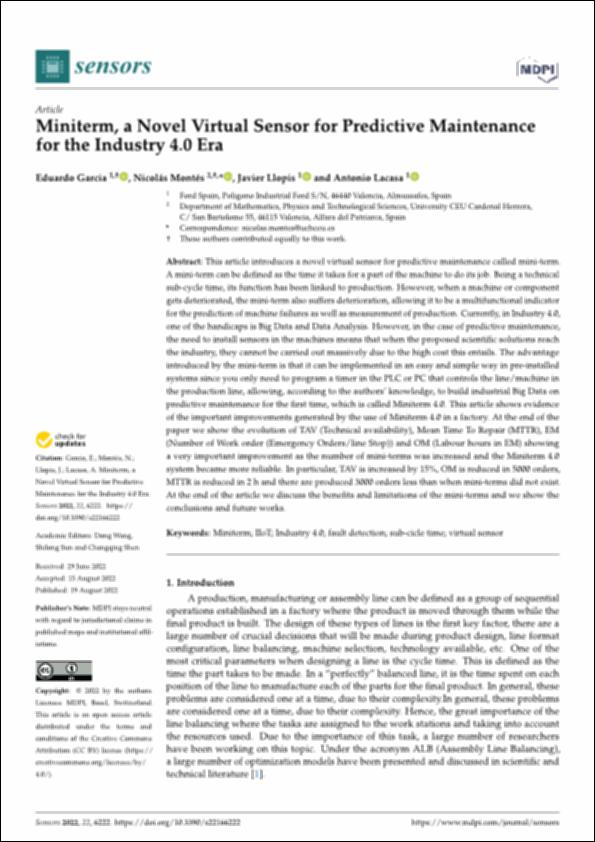Por favor, use este identificador para citar o enlazar este ítem:
http://hdl.handle.net/10637/14311Miniterm, a novel virtual sensor for predictive maintenance for the industry 4.0 era
| Título : | Miniterm, a novel virtual sensor for predictive maintenance for the industry 4.0 era |
| Autor : | García Magraner, Eduardo Andrés Montés Sánchez, Nicolás Llopis Ballester, Javier Lacasa Corral, Antonio |
| Materias: | Industria del automóvil - Producción.; Automóviles - Producción.; Automobile industry and trade - Production.; Automobile industry and trade - Automation.; Industria del automóvil - Automatización.; Automóviles - Fabricación - Teledetección.; Automobiles - Manufacturing - Remote sensing.; Automobiles - Production. |
| Editorial : | MDPI |
| Citación : | Garcia, E., Montés, N., Llopis, J. & Lacasa, A. (2022). Miniterm, a novel virtual sensor for predictive maintenance for the industry 4.0 era. Sensors, vol. 22, i. 16 (19 aug.), art. 6222. DOI: https://doi.org/10.3390/s22166222 |
| Resumen : | This article introduces a novel virtual sensor for predictive maintenance called mini-term. A mini-term can be defined as the time it takes for a part of the machine to do its job. Being a technical sub-cycle time, its function has been linked to production. However, when a machine or component gets deteriorated, the mini-term also suffers deterioration, allowing it to be a multifunctional indicator for the prediction of machine failures as well as measurement of production. Currently, in Industry 4.0, one of the handicaps is Big Data and Data Analysis. However, in the case of predictive maintenance, the need to install sensors in the machines means that when the proposed scientific solutions reach the industry, they cannot be carried out massively due to the high cost this entails. The advantage introduced by the mini-term is that it can be implemented in an easy and simple way in pre-installed systems since you only need to program a timer in the PLC or PC that controls the line/machine in the production line, allowing, according to the authors’ knowledge, to build industrial Big Data on predictive maintenance for the first time, which is called Miniterm 4.0. This article shows evidence of the important improvements generated by the use of Miniterm 4.0 in a factory. At the end of the paper we show the evolution of TAV (Technical availability), Mean Time To Repair (MTTR), EM (Number of Work order (Emergency Orders/line Stop)) and OM (Labour hours in EM) showing a very important improvement as the number of mini-terms was increased and the Miniterm 4.0 system became more reliable. In particular, TAV is increased by 15%, OM is reduced in 5000 orders, MTTR is reduced in 2 h and there are produced 3000 orders less than when mini-terms did not exist. At the end of the article we discuss the benefits and limitations of the mini-terms and we show the conclusions and future works. |
| Descripción : | Este artículo se encuentra disponible en la siguiente URL: https://www.mdpi.com/1424-8220/22/16/6222 Este artículo de investigación pertenece al número especial "Machine Health Monitoring and Fault Diagnosis Techniques". |
| URI : | http://hdl.handle.net/10637/14311 |
| Derechos: | http://creativecommons.org/licenses/by/4.0/deed.es |
| ISSN : | 1424-8220 (Electrónico) |
| Idioma: | es |
| Fecha de publicación : | 19-ago-2022 |
| Centro : | Universidad Cardenal Herrera-CEU |
| Aparece en las colecciones: | Dpto. Matemáticas, Física y Ciencias Tecnológicas |
Los ítems de DSpace están protegidos por copyright, con todos los derechos reservados, a menos que se indique lo contrario.


